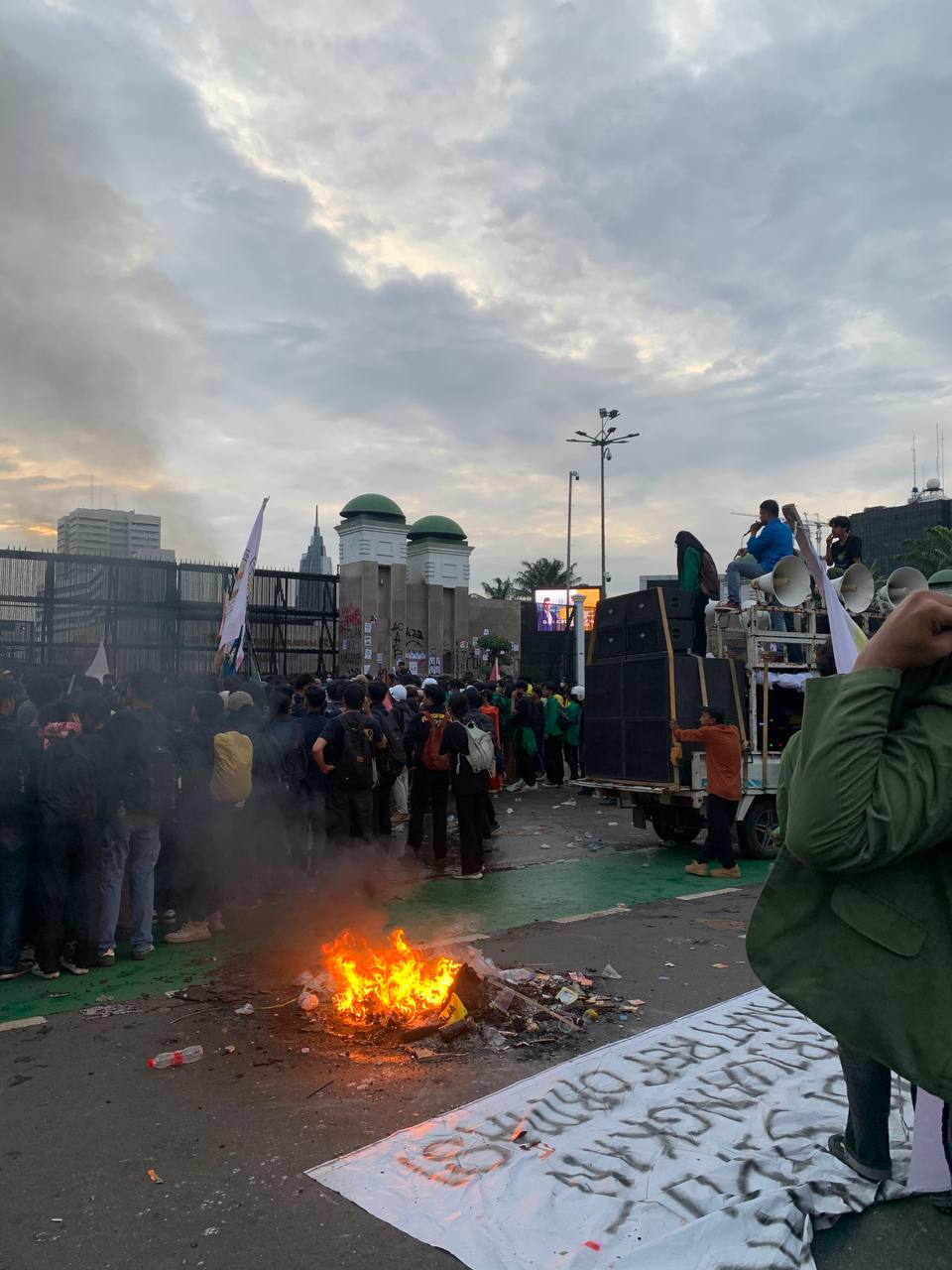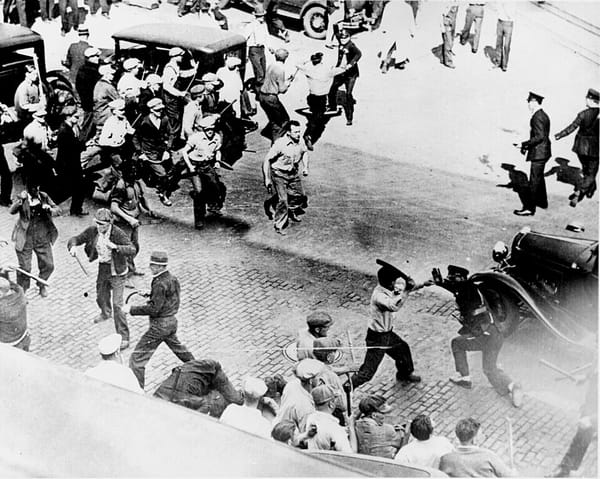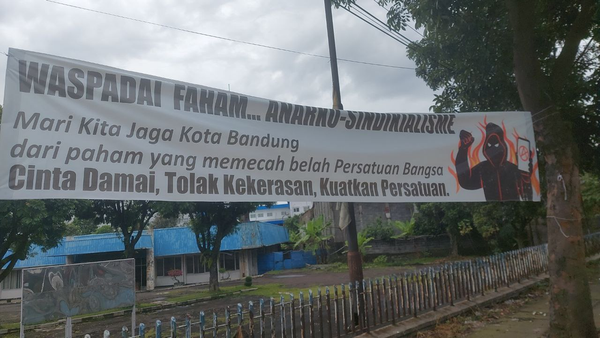Rejection of the Revision of the Indonesia Military Law: Anarchists at a Crossroad.

Despite massive rejection since it was proposed, the revision of the Indonesia Military Law (RUU TNI) was still enacted on March 20, 2025. After the enactment, the rejection from the people escalated and gave birth to massive #TolakRUUTNI (literally translated to reject the revision of the Indonesia Military Law) demonstrations throughout Indonesia. Starting from March 20, 2025 to March 28, 2025, there were 69 demonstrations, all of which – of course – received brutal repression from state officials.
Violence against those who express their rejection of the revision of the Indonesia Military Law occurs in various aspects, both physically and digitally. There are countless beatings, arrests, arbitrary punishments without due process, or even threats against medical personnels and ambulances who help evacuate victims of state apparatus violence. Not only that, digital persecution is also often experienced by those who reject the newly revised Indonesia Military Law (hereinafter referred to as the New Indonesia Military Law) in their expressions on social media.
Journalistic works, which are ideally supposed to be an ideal prerequisite for a democratic country, have also been terrorized. At least two acts of violence have been recorded against Tempo, a media outlet that has long been known to be critical and works based on the principles of good journalism. First, Tempo was terrorized by being sent a pig's head, then 6 dead rats with their heads cut off. Both were sent on two different days, March 19, 2025 and in the early hours of March 22, 2025. It is strongly suspected that this was related to Tempo's vocal rejection of the enactment of the revision of the Indonesia Military Law in its journalistic products.
We can see together, the state is using all kinds of available and possible efforts to insist on passing the revision of the Indonesia Military Law.
The Real Question: What is the Reason Behind the State's Insistence on Passing the Revision of the Indonesia Military Law?
The state has –of course– never openly revealed the reasons behind its insistence on passing the revision of the Indonesia Military Law. But the passing of the revision did not come from a vacuum. It was part of a series of facts that had occurred previously.
First, gestures of authoritarianism have indeed been shown throughout Indonesia's history as a republic, including and especially during the two terms of Joko Widodo's (Jokowi) administration in 2014 - 2024.
In the ten years of Jokowi's regime, repressions have often targeted and marginalized several vulnerable groups –religious, racial, and gender minority groups– whose existence are not accepted by the majority of society due to differences in religious interpretation, racial and ethnic differences, and so on. The government often takes side with the interests of the majority groups by continuously perpetuating the stigma and using it as a pretext for discrimination and human rights violations against many vulnerable groups instead of protecting everyone regardless of their background. This is known as majoritarianism, and it is done to continue to maintain support from the majority to perpetuate the stability of its power.
Cases such as the ban on the establishment of places of worship, persecution and violence against the Ahmadiyya group, local religious or belief groups, the LGBTQIA+ community, and the existence of the death penalty in positive laws in Indonesia, and so on, are just a few examples.
Then, in approaching to the 2024 election, Jokowi used his power to build his political dynasty. Through his brother-in-law who was given the position of Chief of the Constitutional Court, the regulation on the minimum age limit for vice presidential candidates was changed to be younger so that his son could run, and of course, as we can predict, he was elected vice president.
Some legal experts call this behavior of legal manipulation as a form of autocratic legalism.
The military-supported-authoritarianism gesture became even stronger when Jokowi's regime openly stated its political stance that it did not care about human rights violations committed by the military. In the Universal Periodic Review session in 2022, a human rights mechanism under the UN where each country takes turns being reviewed its human rights situation, the Government of Indonesia rejected many recommendations to improve the human rights situation in the country, including to carry out legal proceedings against violence committed by armed forces –including the military– in Papua.
Second, the bias towards the interests of large capital owners, investors, multinational companies, or whatever they are called, is also very obvious in at least ten years of Jokowi's administration. Capitalism has always been the reason behind a series of violence as written in the previous paragraphs, and is also the reason behind a series of violations of economic, social, and cultural rights against many groups of people in Indonesia.
One of the modes of defending the above matters is by making the business projects of those big capital owners, investors, or multinational companies as National Strategic Projects (Proyek Strategis Nasional - PSN) which in practice often seize the land of the people and the rights of indigenous peoples to their land. Those PSN, then, are considered part of the government's policy to carry out development and economic improvement in the country. The defense of the interests of the big capital owners is carried out under the pretext of developmentalism.
Throughout 2015 to 2023, the Agrarian Reform Consortium (Konsorsium Pembaruan Agraria - KPA) recorded at least 73 conflicts related to PSN. Of the 161 PSN recorded as of September 2023, all of them seized indigenous land, which according to the Indigenous Peoples Alliance of the Archipelago (Aliansi Masyarakat Adat Nusantara - AMAN) occurred in 301 cases involving the seizure of 8.5 hectares of indigenous peoples' land in the period 2018 to 2022 alone.
Also in the name of developmentalism, Jokowi's regime silenced anyone who opposes its developmental policies. The accusation of "going against national interests" is used as justification for a series of repressions and violence carried out in so many regions all over Indonesia.
The Indonesian Legal Aid Foundation (Yayasan Lembaga Bantuan Hukum Indonesia - YLBHI) noted the high level of criminalization of human rights and environmental defenders in PSN. Until 2023, out of 35 PSN projects advocated by Legal Aid Institutes under YLBHI's coordination, at least 85 people were criminalized. There were 212 agrarian conflicts that resulted in 497 cases of criminalization of land rights defenders. At least 268 human rights, environmental, and indigenous peoples defenders were attacked.
Autocratic legalism or legal manipulation is also consistently carried out brutally in the name of defending the interests of the state and the owners of large capital, which we can then call as the oligarchs. Draconian laws such as the Electronic and Information Transaction Law and the Revised Criminal Code were made to justify silencing criticism towards the government's pro-capitalist policies.
A series of laws were also created to ensure that these oligarchs could increasingly arbitrarily oppress indigenous groups, seizing the lands, and ensure that capital owners could more exploit natural resources and workers, and be protected by positive laws.
The latter was manifested in the creation of the Omnibus Law on Job Creation, which was made in silence and secretfully during the Covid-19 crisis. Later, they used the pandemic as a reason to strike down the massive rejection movement carried out by the Indonesian people against the law.
The brutal partisanship towards the interests of the oligarchs and a series of law-making that violated the law itself later became a snowball of public anger that crystallized into the next two major waves of demonstration, namely the #PeringatanDarurat (Emergency Warning) demonstrations in August 2024 and the #IndonesiaGelap (Dark Indonesia) demonstrations in February 2025. Specifically, this matter will be discussed in another article.
Third, the current president's background as a former high-ranking Army officer. Prabowo Subianto is a former Army general who spent more than half of his life as part of the Army in the Soeharto era, which as an institution, the Army was indeed involved in many human rights violations and gross human rights violations, Prabowo as an individual was also specifically involved and should be held responsible for several of those gross human rights violations.
He was involved in the Seroja Operation carried out by the Army during the Indonesian occupation of East Timor (now Timor-Leste) from 1975 to 1998. The Seroja Operation as a whole is estimated to have killed tens of thousands of lives. Specifically, Prabowo was (strongly suspected) of being involved in the Santa Cruz massacre, which took place at the
Santa Cruz Cemetery, where hundreds of people who were attending the funeral of a Timorese independence fighter were shot with hot lead from the Army weapons. The victims were at least 271 people. Some say more than 300. Or we can also mention the Kraras Massacre, also a part of the Seroja Operation, which took hundreds of lives.
Outside of the Seroja Operation, Prabowo was also (again, strongly suspected) involved in the forced disappearances of several pro-democracy activists. The Rose Team (Tim Mawar) was a special team under Kopassus that was deliberately formed to silence criticism from pro-democracy activists throughout 1996 to 1998. At that time, Prabowo was the Commander General of Kopassus. The forced disappearances carried out by the Rose Team killed and forcibly disappeared dozens of pro-democracy activists. Some managed to return, but until now there are at least 13 people whose whereabouts are still unknown.
Anarchists’ Dilemma in the Rejection of the Revision of Indonesia Military Law
In the discussions, demonstrations, or movements on social media related to the rejection of the revision of the Indonesia Military Law #TolakRUUTNI, many anarchists were seen involved. Or, at least, those who appear as anarchists, with circled-A shirts or flags or other anarchist symbols, and also equipped with typical anarchist slogans and murals that also depict anarchist symbols.
As anarchists, of course we are familiar with the classic debates every time we see similar cases where there are anarchists involved in demonstrations, discussions, or other forms of expression that reject the formation of laws in a country. Specifically in this case, the revision of the Indonesia Military Law or the New Indonesia Military Law.
The New Indonesia Military Law legally replaces the previous Indonesia Military Law (hereinafter referred to as the Old Indonesia Military Law). If we look at it in black and white, then it can be considered that the rejection of the new law is support for maintaining the old law.
With the involvement of anarchists in rejecting the New Indonesia Military Law, perhaps some of us are tickled by arguments in our own heads, such as “why are anarchists joining in rejecting the new law? Does this mean they support the old law, which we know is a product of the state? Shouldn’t anarchists not move within the corridors of the state? Isn’t this a sign that anarchists recognize the state?”
Before we get to that discourse, it is perhaps important to first understand some of the key reasons why this New Indonesia Military Law needs to be rejected.
First, the New Indonesia Military Law opens a wider path for Indonesia Military personnels to enter the civilian realm, including in terms of employment. The new law states that Indonesia Military personnels can occupy civilian positions in 16 ministries/state institutions.
Meanwhile, for reasons of state budget efficiency, the dismissal of state civil servants (Aparat Sipil Negara - ASN) has occurred everywhere, the appointment of prospective state civil servants (Calon Aparat Sipil Negara - CASN) has been postponed and caused the unemployment rate to rise. In the midst of the lack of job availability, the Indonesia Military personnels are instead given the widest possible path to have two or more jobs at once.
The number of 16 ministries/state institutions opened to the Indonesia Military personnels may seem small. But in fact, although the old law only allowed the Indonesia Military personnels to work in 10 ministries/state institutions, thousands of Indonesia Military personnels were recorded working in thousands of civilian positions.
Imparsial, a non-government organization in Indonesia whose one of main focus is to monitor human rights violations done by the military and the police, noted that in 2023, there were 2,569 active military personnels occupying civilian positions. Meanwhile, the Indonesian
Legal Aid and Human Rights Association (Perhimpunan Bantuan Hukum dan HAM Indonesia - PBHI) recorded 86 MoUs between the Indonesia Military and civilian institutions. This is a sign that this is not just about numbers, but about efforts to legitimize them to more seize people's rights to decent employment. This has a huge impact on the lives of the working class in Indonesia, which is the focus of the anarcho-syndicalist group's issues.
Second, the fact that the New Indonesia Military Law was created with the spirit of pulling the military back into the civil socio-political and economic-business spaces, holds so many dangers. The military personnels live in military law which in practice is always carried out behind closed doors, and is full of impunity. This threatens the existence of civil rights because the personnels can act arbitrarily.
So far, the discourses on anarchism in general, and anarcho-syndicalism in particular, have lived in civil spaces.
After the 1998 Reformation, the military was withdrawn from the civilian sphere. The Armed Forces of the Republic of Indonesia (Angkatan Bersenjata Republik Indonesia - ABRI) were divided into the Indonesia Military and Indonesia Police, where the military was tasked with managing defense affairs, and the police was tasked with managing domestic security affairs.
The pulling of the military back into the civilian sphere will endanger the existence of discourse on anarchism, as well as the anarchists themselves.
Moreover, in recent years, precisely since 2018, the existence of anarchism and/or anarchist groups has been used as a new scapegoat by state officials, especially the military, as an effort to legitimize that there is a security and defense threat to the existence of the state. This began to be done because the specter of communism was no longer too capable of being used as a scapegoat.
For the record, the specter of communism was always used as a scapegoat during the leadership of Soeharto in 1965 - 1998, who was also a former high-ranking Army officer. With the accusation of an armed coup pinned on the Indonesian Communist Party (Partai Komunis Indonesia - PKI), the military, especially the Army, carried out a "environment cleansing" by killing people who were considered members or simply affiliated with the PKI or its underbouw organisations. Throughout 1965 - 1966, based on the findings of several historians and Indonesianists such as Benedict Anderson, it was recorded that 500,000 - 3,000,000 people were killed, not including those who were imprisoned without trial, or who became exiles and could not return home.
In the absence of war or external threats to the country's defense, the military needs a scapegoat to remain relevant, and of course to continue to be able to access the state budget. Therefore, learning from its experience became relevant during Soeharto's militaristic government, in the creation of the Old Indonesia Military Law, military duties were classified into two, namely Military Operations for War (Operasi Militer Perang - OMP) and Military Operations Other Than War (Operasi Militer Selain Perang - OMSP). Some of the tasks covered in OMSP include overcoming terrorism, armed separatism, and armed rebellion.
Third, the New Indonesia Military Law increases the military's OMSP duties. Specifically, the new law allows the military to conduct cyber operations under the pretext of assisting in efforts to combat cyber defense threats, especially those that attack defense systems. It should be noted that so far, many anarchist individuals or groups have been spreading their ideas and concepts through cyberspace.
Given the fact that in recent years anarchism and/or anarchists have begun to be identified as threats, allowing the military to do surveillance on civilians and enter civilian spaces will of course – again – have an impact on the existence of discourses on anarchism, as well as the anarchists themselves. Moreover, by considering Prabowo's track record with a strong military background and his involvement in silencing critical voices or those considered to be disruptive to the stability of the country.
Anarchists at a Crossroad
Arguments such as “anarchists do not need to join in rejecting the New Indonesia Military Law because any law is a product of the state” as written in several paragraphs before this, certainly exist and are valid.
At the same time, the anger and concern that arose with the passing of the new law also exist and are no less valid. In fact, perhaps, it comes with high urgency, because it threatens the continuation of the discourse of anarchism and the lives of the anarchists themselves.
The existence of the two things above may put anarchists at a crossroads: between choosing one path, with certain considerations, or choosing the other path, with certain considerations –which may both be correct.
Fortunately, anarchism is not an ideology that requires uniformity like other ideologies. We can, and it is okay, to have different opinions and take different paths or routes, which are not always straight and may be a bit detoured. There is no better way to win, no better way to lose.
But before talking about paths or methods that may be different, anarchists certainly agree absolutely on one thing: that it is true that anarchism opposes all forms of hierarchy, but what it opposes first of all is all forms of oppression. And oppression is always power. All forms; no matter whether it is a system or not.
Ultimately, the reason why anarchism exists is to fight against the threat of power. Power must be equalized, so that no one can control or be controlled – at least by fear. My personal efforts, or perhaps those of other anarchists who also reject the revision of the Indonesia Military Law, are not a form of recognition of the state or power, but rather an effort to equalize power itself.





